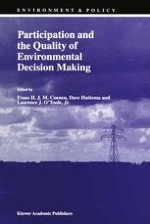1998 | OriginalPaper | Buchkapitel
Learning from Past Experience? Local Agenda 21 Processes and Integrated Urban Development Planning in Germany
verfasst von : Sandra H. Lustig, Ulrike Weiland
Erschienen in: Participation and the Quality of Environmental Decision Making
Verlag: Springer Netherlands
Enthalten in: Professional Book Archive
Aktivieren Sie unsere intelligente Suche, um passende Fachinhalte oder Patente zu finden.
Wählen Sie Textabschnitte aus um mit Künstlicher Intelligenz passenden Patente zu finden. powered by
Markieren Sie Textabschnitte, um KI-gestützt weitere passende Inhalte zu finden. powered by
Local Agenda 21 (LA 21) processes are moving slowly in Germany and are concentrated on environmental issues. The current debate on sustainable urban development is, in part, focusing on issues that were dealt with in the 1970s by Stadtentwicklungsplanung (STEP), a form of integrated urban development planning, but frequently without using the experiences from those efforts. In this chapter, STEP and LA 21 in Germany are characterised and compared to each other using structural and functional criteria. Using the experiences with STEP, recommendations for the practice of LA 21 are made. LA 21 goes beyond STEP, but there are lessons to be learned. LA 21 efforts, which concentrate on one or a few issues, should develop a long-term plan of action. It is important for LA 21 initiatives to clarify their status and their relations to the other forms of planning’ When assessing what may be realistic for LA 21, it is essential to be conscious of the local power structure, the local planning system, and the potentials and limitations both of public participation and of local government itself. If this knowledge is used constructively, participatory LA 21 processes will be able to contribute to urban sustainability and to improving local decision-making processes.
